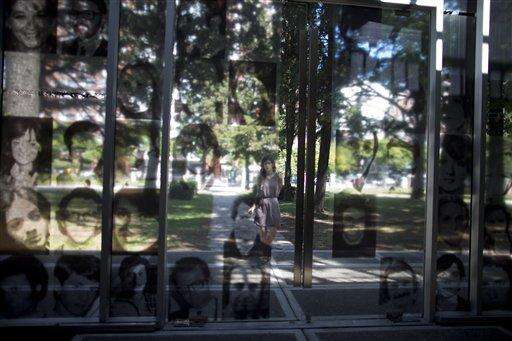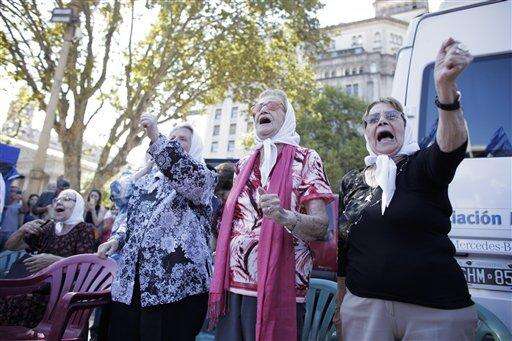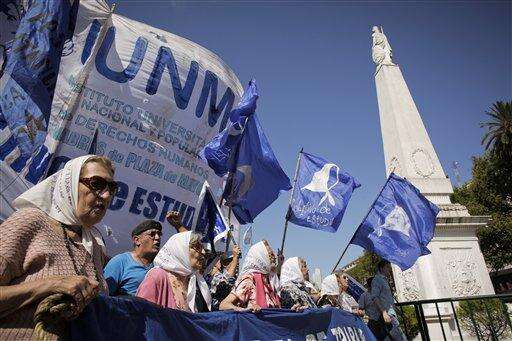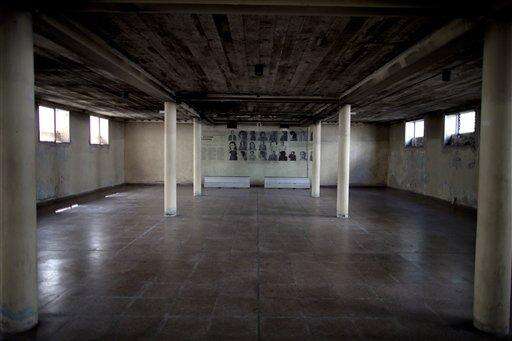President Barack Obama and Argentine President Mauricio Macri toss roses into the river during their visit to Parque de la Memoria (Remembrance Park) in Buenos Aires, Argentina, Thursday, March 24, 2016. Obama visited the memorial to victims of the country's murderous US-backed dictatorship who were killed or went missing from 1976-1983. (AP Photo/Pablo Martinez Monsivais)
The Associated Press
BUENOS AIRES, Argentina (AP) - As many Argentines paused to remember loved ones killed during their country's brutal dictatorship, President Barack Obama said Thursday that America was slow to speak out for human rights during that painful period and promised an honest accounting going forward.
Obama's comments, sure to reverberate in Argentina and beyond, came 40 years to the day that a 1976 coup opened a period of military rule in Argentina that continues to have repercussions today.
Obama paid tribute to the victims of Argentina's "Dirty War" by visiting Remembrance Park and tossing a wreath into the Rio de La Plata river near a memorial bearing thousands of names.
"We've been slow to speak out for human rights and that was the case here," said Obama, standing alongside Argentina's new president, Mauricio Macri.
Obama said it takes courage for a society to address "uncomfortable truths" about its past, but that doing so is essential to moving forward.
Prominent human rights groups shunned an invitation to attend, arguing that the presence of an American president on such an important date was disrespectful to the thousands who died.
Nora Cortinas of the iconic Mothers of the Plaza de Mayo group called Obama "a representative of death."
"What would victims say if they saw (us) hugging and paying homage to a president from a country responsible for state terrorism?" she told a local radio station hours before the event.
The anniversary is always a sensitive time for the nation of 41 million, as many families are still searching for the remains of loved ones who disappeared and are presumed dead. Even decades later, the dictatorship is a topic of national importance. It shapes mainstream political ideologies and spawns debates over whether the government should continue to try perpetrators so many years later or spend millions on searching for remains.
Obama said his administration will endeavor to make amends by declassifying even more documents that could shed light on what role the U.S. may have played in one of the region's most repressive dictatorships. The release likely will come after Obama leaves office next year.
Thousands of State Department documents were declassified in 2002, but they don't paint a full picture of what the U.S. knew or its possible role in bloodshed. The most suggestive document is a series of notes from a late 1976 meeting between Secretary of State Henry Kissinger and Argentina's foreign minister.
"If there are things that have to be done, you should do them quickly," Kissinger said, according to a transcript, suggesting an implicit green-lighting of a clampdown on dissidents.
The new classification, which the Obama administration first announced last week, will include military and intelligence papers for the first time. Human rights groups have long demanded those documents, and historians say they could include grisly accounts of abuses and possibly more information about a U.S. role.
Rights groups believe U.S. backing for authoritarian regimes in Latin America extended to Argentina during the 1976 to 1983 period known as the "Dirty War."
Some 13,000 people were killed or disappeared during the brutal rule of "the generals," according to government estimates. Rights groups put the number closer to 30,000.
Yet even Obama's promise of a full accounting hasn't quelled concerns. As Obama first met with Macri on Wednesday, protesters gathered in Buenos Aires to express anger at his visit.
Hundreds of protesters greeted Obama upon his arrival Thursday afternoon to Bariloche, a picturesque city in southern Argentina where Obama spent the afternoon with his family before returning to Washington.
And Thursday evening, tens of thousands participated in a downtown Buenos Aires march commemorating the 40th anniversary.
In the crowd was Susana Gonzalez, 58, who said in 1978 her then-boyfriend Alejandro Campobianco disappeared and was never heard from again. Gonzalez said Campobianco had political views against the government, but he was not a rabble-rouser and never took up arms.
"We are not going to be fooled by some flowers thrown in the river," said Gonzalez. "These are our disappeared, not those of these liars and hypocrites."
___
Associated Press reporter Debora Rey in Buenos Aires contributed to this report.
____
Reach Josh Lederman on Twitter at http://twitter.com/joshledermanAP and Peter Prengaman on Twitter at http://twitter.com/peterprengaman
People carry a banner with photos of the victims of the 1976-83 dictatorship, during a march marking the 40th anniversary of the military coup in Buenos Aires, Argentina, Thursday, March 24, 2016. In the first visit for a U.S. president in nearly 20 years to Argentina, President Barack Obama coincided with the anniversary of the 1976 coup, stirring up lingering questions about America's role supporting the military dictatorship that followed. (AP Photo/Victor R. Caivano)
The Associated Press
President Barack Obama and Argentine President Mauricio Macri visit Parque de la Memoria in Buenos Aires, Argentina, Thursday, March 24, 2016. Obama visited the memorial to victims of the country's murderous US-backed dictatorship who were killed or went missing from 1976-1983. (AP Photo/Pablo Martinez Monsivais)
The Associated Press
President Barack Obama watches as Argentine President Mauricio Macri tosses roses into the river during their visit to Parque de la Memoria (Remembrance Park) in Buenos Aires, Argentina, Thursday, March 24, 2016. Obama visited the memorial to victims of the country's murderous US-backed dictatorship who were killed or went missing from 1976-1983. (AP Photo/Pablo Martinez Monsivais)
The Associated Press
President Barack Obama and Argentine President Mauricio Macri visit Parque de la Memoria (Remembrance Park) in Buenos Aires, Argentina, Thursday, March 24, 2016. Obama visited the memorial to victims of the country's murderous US-backed dictatorship who were killed or went missing from 1976-1983. (AP Photo/Pablo Martinez Monsivais)
The Associated Press
CORRECTS SPELLING OF MARCELO BRODSKY - President Barack Obama and Argentine President Mauricio Macri, right, listen to Marcelo Brodsky at Parque de la Memoria (Remembrance Park) in Buenos Aires, Argentina, Thursday, March 24, 2016. Obama visited the memorial to victims of the country's murderous US-backed dictatorship who were killed or went missing from 1976-1983. Brodsky's brother Fernando Brodsky is one of the people who disappeared. (AP Photo/Pablo Martinez Monsivais)
The Associated Press
President Barack Obama and Argentine President Mauricio Macri visit Parque de la Memoria in Buenos Aires, Argentina, Thursday, March 24, 2016. Obama visited the memorial to victims of the countryâs murderous US-backed dictatorship who were killed or went missing from 1976-1983. (AP Photo/Pablo Martinez Monsivais)
The Associated Press
In this March 3, 2016 photo, Mothers of Plaza de Mayo human rights group arrive at Plaza de Mayo do their traditional Thursday march in Buenos Aires, Argentina, Thursday, March 3, 2016. The human rights group began marching there in 1977 to demand answers from the military junta on their missing relatives.When President Barack Obamaâs state visit to Buenos Aires Wednesday, a day before the 40th anniversary of the 1976 military coup has raised questions about the United Statesâ relationship with one of the most repressive military dictatorships in Latin American history. (AP Photo/Victor R. Caivano)
The Associated Press

In this March 16, 2016 file photo, a window is filled with pictures of people who were disappeared during the country's 1976-1983 military dictatorship, at the former Argentine Navy School of Mechanics where people were tortured, today a museum in their honor, called the Space for Memory and for the Promotion and Defense of Human Rights, in Buenos Aires, Argentina. The second day of President Barack Obamaâs visit, March 24, will mark the 40th anniversary of the military coup that ushered in one of the most repressive military dictatorships in Latin American history. (AP Photo/Natacha Pisarenko)
The Associated Press

In this March 3, 2016 photo, Mothers of Plaza de Mayo human rights group shout slogans at their traditional Thursday march around the obelisk at Plaza de Mayo in Buenos Aires, Argentina. The human rights group began marching there in 1977 to demand answers from the military junta on their missing relatives. When President Barack Obamaâs state visit to Buenos Aires Wednesday, a day before the 40th anniversary of the 1976 military coup has raised questions about the United Statesâ relationship with one of the most repressive military dictatorships in Latin American history. (AP Photo/Victor R. Caivano)
The Associated Press
President Barack Obama speaks during a joint statement with Argentine President Mauricio Macri at Parque de la Memoria in Buenos Aires, Argentina, Thursday, March 24, 2016. Obama visited the memorial to victims of the countryâs murderous US-backed dictatorship who were killed or went missing from 1976-1983. (AP Photo/Pablo Martinez Monsivais)
The Associated Press

In this March 3, 2016 photo, Mothers of Plaza de Mayo human rights group do their traditional Thursday march around the obelisk at Plaza de Mayo in Buenos Aires, Argentina, Thursday, March 3, 2016. The human rights group began marching there in 1977 to demand answers from the military junta on their missing relatives.When President Barack Obamaâs state visit to Buenos Aires Wednesday, a day before the 40th anniversary of the 1976 military coup has raised questions about the United Statesâ relationship with one of the most repressive military dictatorships in Latin American history. (AP Photo/Victor R. Caivano)
The Associated Press

This March 16, 2016 photo shows the basement where detainees were processed at the former Argentine Navy School of Mechanics, where torture took place during the country's 1976-1983 military dictatorship, today a museum in honor of the victims, called Space for Memory and for the Promotion and Defense of Human Rights, in Buenos Aires, Argentina. As the controversy of President Barack Obama's March 23-22 visit gathered steam, last week the Obama administration announced it plans to declassify CIA, FBI and other secret internal documents from Argentina's dictatorship. Argentines hope the documents will address unanswered questions about America's role during that period. (AP Photo/Natacha Pisarenko)
The Associated Press